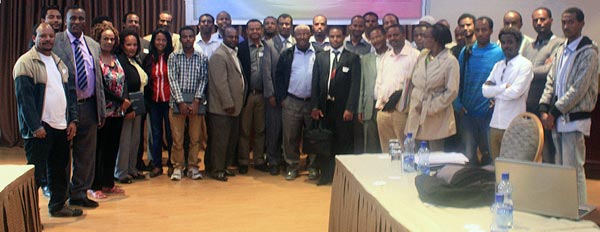By Kindie Tesfaye

Climate change research in Ethiopia must be nationally relevant for research outputs to be used broadly – from farms to influencing policy – a CIMMYT researcher said at the country’s National Climate Change Adaptation Workshop last month. The Biometrics, GIS and Agrometeorology Directorate (BGAD) of the Ethiopian Institute of Agricultural Research (EIAR) organized the event with CIMMYT, the CGIAR Research Program on Climate Change, Agriculture and Food Security (CCAFS) and the Rockefeller Foundation. More than 50 participants from CGIAR centers, the community, federal and regional research institutions, NGOs, the media and universities attended the workshop in Addis Ababa on 19 September. The purpose of the workshop was to receive feedback from stakeholders on the climate change research EIAR is conducting with its partners.
Major issues presented, discussed and displayed at the workshop included: decadal and seasonal climate forecast information provided to farmers; the mainstreaming of climate change; the trends and implications of extreme climatic events; downscaling future climate data for local climate change analysis; drought frequencies and trends; climate change vulnerability mapping; and climate database building. Fantahun Mengistu, Director General of EIAR, said climate change is already affecting Ethiopian agriculture in the form of frequent droughts and floods, which affect the livelihoods of millions of smallholder farmers. He added that the Ethiopian government is aware of the challenges posed by climate change and has policies, strategies and programs in place to increase the resilience of the agriculture sector and the economy, such as the national Climate Resilient Green Economy (CRGE) strategy.
CIMMYT’s Kindie Tesfaye said the major reason CIMMYT-CCAFS works with EIAR and other stakeholders in Ethiopia is to make its climate change research applicable on a national level. The climate research outputs generated by BGAD and partners were used as inputs during the development of Ethiopia’s CRGE strategy and in advising the firm developing the national climate change adaptation strategy. BGAD Director Andualem Shimelis highlighted the importance of agriculture in Ethiopia’s economy and its vulnerability to the threat of climate change. He said Ethiopia needs to adapt agriculture to the threat of climate change because agriculture is crucial in achieving food security and advancing rural development. Promoting integrated agricultural technologies and knowledge of climate science in Ethiopia’s development arena is not a choice, but a matter of survival, Mengistu said. All those involved in climate change research and development should work together in order to contribute to a climate-adapted agricultural sector and a climate-resilient economy in the country.
 Capacity development
Capacity development